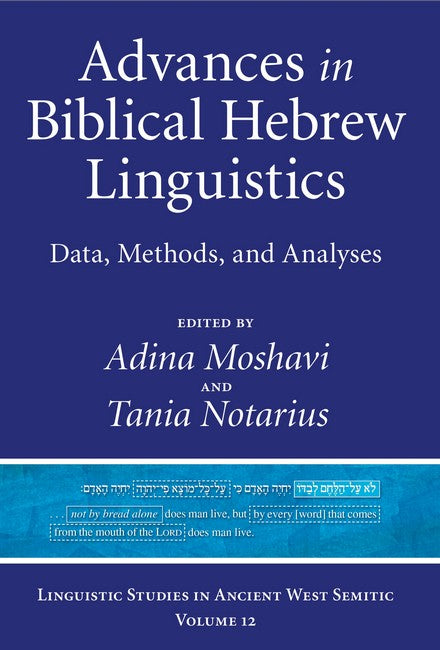Part I: Linguistics and Philology
Linguistic Change through the Prism of Textual Transmission: The Case of Exod 12:9
Noam Mizrahi
All Is Not Lost: Linguistic Periodization in the Face of Textual and Literary Pluriformity
Aaron Hornkohl
Part II: Historical Linguistics and Language Contact
Aramaic Influence and Inner Diachronic Development in Hebrew Inscriptions of the Iron Age
Yigal Bloch
The Linguistics of Writings Systems and the Gap in the Hebrew Scribal Tradition
William Schniedewind
The Second-Person Non-Negated Jussive in Biblical Hebrew and Ancient Northwest Semitic
Tania Notarius
Part III: Text-Linguistics and Linguistic Pragmatics
Participant Tracking, Positioning and the Pragmatics of Biblical Narrative
Frank H. Polak
Nominal and Verb-Second Clauses Not Introduced by waw: A Text-Linguistic Classification
Gregor Geiger
Verticality in Biblical Hebrew Parallelism
David Toshio Tsumura
The Infinitive Absolute and Topicalization of Events in Biblical Hebrew
Galia Hatav
Part IV: Syntactic Studies
Clause Combining in the Song of Moses (Deut. 32:1–43): An Example of Archaic Biblical Hebrew Syntax
Bo Isaksson
The Syntactic Pattern: qtol —> weyiqtol and the Expression of Indirect Command in Biblical Hebrew
Lina Petersson
The Scope of Negation Inside and Outside of the Biblical Hebrew Prepositional Phrase
Cynthia L. Miller-Naudé and Jacobus A. Naudé
The Locative Alternation in Biblical (and Modern) Hebrew
Edit Doron & Keren Dubnov
Part V: Applied Linguistics
Corpus-driven Valence: Give and the Meaning of natan (ntn) in Genesis
Nicolai Winther-Nielsen

